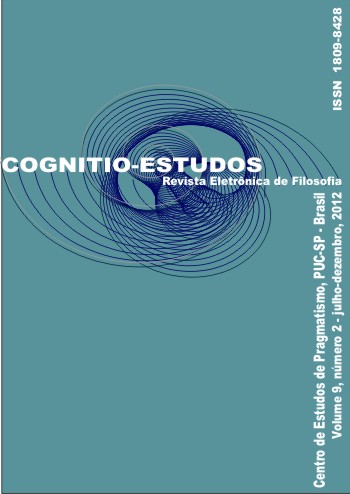Intentionality, Fitness and Evolution in William James's Pragmatism
Palavras-chave:
Adaptationism, Selectionism, Meaning, Truth, Correspondence TheoryResumo
The purpose of this paper is to provide evidence of the outstanding participation of William James in what is understood as the Evolutionary Epistemology Research Program and his connections with this tradition. Via a rational reconstruction of the Jamesian project, I try to explain the direct influence of Herbert Spencer's evolutionism on the development of his conception of mind and knowledge, surpassing even the well known influence of Darwin. Some authors hold that the procedural aspects and Jamesian evolutionary approach to the origin of mind is essentially Darwinist, but the similarities with Spencer’s system are diverse and meaningful. Although James accepts the correspondence theory, he suggests an omission by Spencer in accomplishing a real teleological analysis on individual interests. Stressing into the question of whether pleasure and pain have some relation with correspondence, he asserts that for a large number of elements in the environment, there should be a correlative neutral internal type, or intermediary, as a sense of reward. The evolutionary concept of fitness subsidizes a satisfactory interpretation to the Jamesian theory of knowledge. Understanding meaning as the conceivable effects of an object’s practical value, James holds the belief that truth is built through the process of an individual's interaction with the world. This evolutionist’s assumption along with his naturalized notion of interest enables a fundamental theory of meaning – a necessary step to support his pragmatic conception of truth.Métricas
Referências
BAIARDI, D. C. (2008). Conhecimento, Evolução e Complexidade na Filosofia Sintética de Herbert Spencer. In: Manuscript. São Paulo: USP-FFLCH; Theses Databank (Master Thesis), 2008.
BORING, Edwin G. (1929). A History of Experimental Psychology. New York: D. Appleton, 1929.
BORING, Edwin G. (1963). History, Psychology and Science. New York: John Wiley and Sons, 1963.
BRADIE, Michael (1986). “Assessing Evolutionary Epistemology”. In: Biology & Philosophy, N. 1, 1986.
CAMPBELL, Donald (1993). “Evolutionary Epistemology”. In: BARTLEY, W.W.; CAMPBEL, D & RADNITZKY, G. Evolutionary epistemology, rationality and the sociology of knowledge. La Salle: Open Court, 1993.
DARWIN, Charles. (1872). The Origin of Species by Means of Natural Selection. (Reprint of the 6TH Edition) London: Oxford University Press, 1951.
DENNETT, D. C. (1982). “Beyond Belief”. In: WOODFIELD, A. (Ed.) Thought and Object: Essays on intentionality. Oxford: Clarendon Press, 1982.
DOYLE, B. (2010). “Jamesian Free Will: The two-stage model of William James”. In: William James Studies, Vol. 5, 2010.
DUNCAN, D. (1908). The life and Letters of Herbert Spencer. In: Herbert Spencer Collected Writings. (Reprint of 1ST edition) London: Routledge & Thoemmes Press, 1996.
GODFREY-SMITH, P. (1996). Complexity and the Function of Mind in Nature. Nova York: Cambridge University Press, 1998.
FODOR, J. A. (1981). “Methodological Solipsism Considered as a Research Strategy in Cognitive Psychology”. In: FODOR, J. A. Representations: Philosophical Essays on the Foundations of cognitive Science. Brighton: Harvester Press, 1981.
FREGA, Roberto (2011). “Evolutionary Prolegomena to a Pragmatist Epistemology of Belief”. In FREGA, R. (Ed.) Pragmatist Epistemologies. Lanham: Lexington, 2011.
HUSSEY, Trevor. (1999). “Evolutionary Change and Epistemology”. In: Biology and Philosophy 14, 1999.
JAMES, William (1878). “Remarks on Spencer’s definition of Mind as Correspondence”. In: Herbert Spencer, Contemporary Assessments - Herbert Spencer Collected Writings. Londres: Routledge & Thoemmes Press, 1996.
JAMES, William (1890). The Principles of Psychology. (Vol. I e II) New York: Dover Publications, 1950.
JAMES, William (1907a). “The Pragmatic Method”. In: McDERMOTT, J. J. (Ed.) The Writings of William James. Chicago: The University of Chicago Press, 1977.
JAMES, William (1907b). “Pragmatism’s Conception of Truth”. In: McDERMOTT, J. J. (Ed.) The Writings of William James. Chicago: The University of Chicago Press, 1977.
KINOUCHI, R. R. (2006). “Darwinismo em James: A Função da Consciência na Evolução”. In: Psicologia: Teoria e Pesquisa, Set-Dec 2006, Vol. 22 n. 3.
PERRY, R. B. (1948). The Thought and Character of William James. Nashville: Vanderbilt University Press, 1996.
SIMON, Linda (2010). Expo William James - Life is in the Transitions. Retrieved from: <http://hcl.harvard.edu > Data of access: 20 September 2011.
POPPER, K. (1978). “Natural Selection and the Emergence of the Mind”. In: BARTLEY, W.W.; CAMPBEL, D & RADNITZKY, G. (Eds.) Evolutionary epistemology, rationality and the sociology of knowledge. La Salle: Open Court, 1993.
PUTNAM, Hilary (1997). “James’s Theory of Truth”. In: PUTNAM, Ruth Anna (Ed.). The Cambridge Companion to William James. Cambridge: Cambridge University Press, 1997.
SPENCER, Herbert (1855). Principles of Psychology. Londres: Routledge & Thoemmes Press, 1996.

